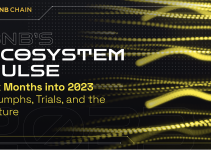
We are excited to announce that pNetwork, a cross-chain composability system that allows assets and Non-Fungible-Tokens (NFTs) to move freely between blockchains, has been successfully integrated on the Binance Smart Chain (BSC) mainnet as our recommended transparent and progressively decentralized cross-chain solution. pNetwork-powered Bitcoin to BSC bridge is now available for use by any and all BSC users and Decentralized Applications.
pNetwork has released its first BSC bridge, enabling Bitcoin to be moved to the Binance Smart Chain. Established to connect Binance Smart Chain (BSC) with top cryptocurrencies and NFTs, the work will continue with the launch of an Ethereum-BSC bridge later this month.
By integrating with pNetwork, Binance Smart Chain gains the ability to support a large variety of cryptocurrencies as well as connections with numerous blockchain networks. pBTC and other pTokens being available on the BSC makes it possible for users to exchange major assets and for DeFi applications to add options when offering stablecoin collateralization, derivatives and lending solutions.
pNetwork powers the highest number of cross-chain connections in the industry, enabling major assets to be tokenised and transferred onto the DeFi ecosystem. BSC is a smart contract blockchain delivering Ethereum Virtual Machine (EVM) compatible programmability which sets a fast and cost-efficient environment to develop high -performance decentralized applications.
As the first and largest cryptocurrency, Bitcoin represents a multi-billion dollar market attracting the attention of Fortune 500 companies and public figures alike. Registering tens of billions of trading volumes per day, the asset represents a great opportunity for Decentralized Finance.
pNetwork serves a key role in the blockchain ecosystem enabling otherwise siloed environments to interoperate. Its network of nodes makes it possible for assets and data to frictionlessly and transparently move from one blockchain to another. pNetwork nodes power the Bitcoin-BSC bridge, creating a secure and transparent way for Bitcoin to navigate towards the Binance Smart Chain (and vice versa) and be integrated into BSC-based dApps.
The Bitcoin-BSC bridge is the first step in the direction of connecting the Binance Smart Chain with other ecosystems. pBTC is a BSC-compatible asset 1:1 pegged with BTC – automated tokenisation of BTC for it to become a BEP20 asset is available for anyone via the pTokens dApp. By doing this, users effectively port the asset onto the Binance Smart Chain and can start using them in the growing BSC DeFi space.
pBTC is a similar-in-concept alternative to BTCB that enables BTC’s tokenisation into the Binance Smart Chain. Where BTCB is a BEP20-version of BTC made available through the Binance exchange, pBTC is a free-to-assess and more transparent alternative. pNetwork-powered cross-chain movements of BTC happen automatically without the need to go through an exchange for the transfer to happen.
The pNetwork x Binance Bitcoin-BSC bridge is powered by a network of nodes that ensure transparency on the tokenisation process. As part of pNetwork’s progressive decentralization, nodes operate a key role in the system ensuring security and transparency on the cross-chain transfers. Both security-oriented technologies and economic incentives for pNetwork nodes are in place for the system to operate according to a high-quality standard.
Read more about the pNetwork-powered Ethereum-BSC bridge here.
About pNetwork
The pNetwork is the underlying architecture for pTokens, a cross-chain system enabling assets to move frictionlessly from one blockchain to another. Currently, pTokens enable the transparent interaction among major blockchain protocols, including Bitcoin, Ethereum, EOS and Litecoin. pNetwork is the progressively decentralized governance layer operating the pTokens bridges and pNetwork Portals. It is home to the pNetwork DAO and the ecosystem’s governance token PNT.


